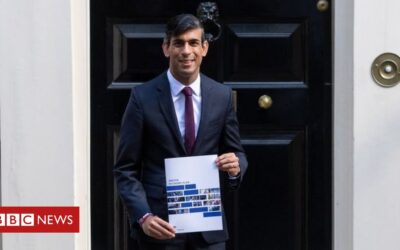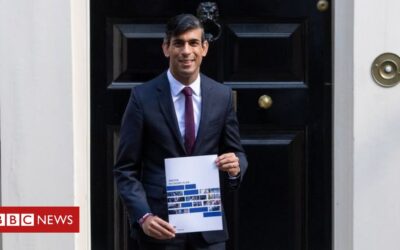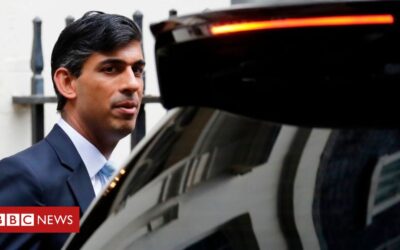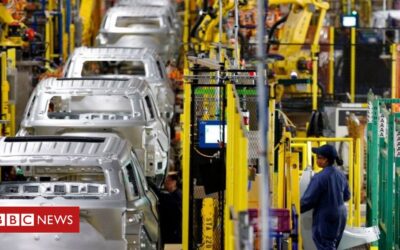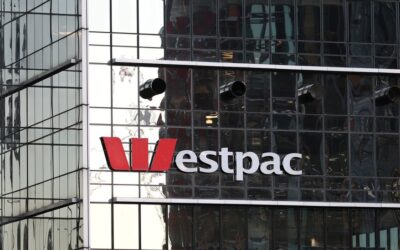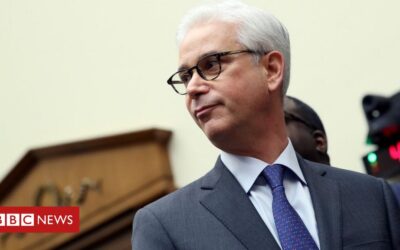Chancellor Rishi Sunak has delivered a statement setting out plans to help workers and businesses hit by new coronavirus restrictions.It includes plans for a job support scheme to replace furlough, help for the self employed, business loans and VAT cuts. Here is a summary of the main points.Job Support SchemeUnder the scheme, the government will subsidise the pay of employees who are working fewer than normal hours due to lower demand
Workers must do at least a third of their normal hours
Employers will pay staff for the hours they work
The government and the employer will pay a third each for the hours they can’t work
It means someone working a third of their hours would receive 77% of their pay
The grant will be capped at £697.92 per month
All small and medium sized businesses will be eligible for the scheme
Larger business will be eligible if their turnover has fallen during the crisis
It will be open to employers across the UK even if they have not previously used the furlough scheme
The scheme will run for six months starting in November and replaces the “furlough” scheme
It means the government will pay a maximum of 22% of someone’s wages, down from 80% at the start of the furlough policy
How could the new Job Support Scheme work?If an employee works reduced hours the employer pays for that. And in addition the employer and government pay one third of the lost pay each (up to the cap).So for someone on £2,000 a month working 50% hours, they would get £1,000 normal pay plus £333 extra from their employer and £333 from the government.Support for the self-employedThe chancellor is extending the self-employed grant on similar terms to the Job Support Scheme
A grant will be available to those eligible for the Self Employment Income Support Scheme Grant
The grant will cover three months’ worth of profits for the period from November to the end of January
It will cover 20% of average monthly profits up to a total of £1,875
A further grant may be available to the self-employed to cover February 2021 to the end of April, depending on circumstances
Business loansBounce Back Loans will be extended from six years to 10, cutting monthly repayments by nearly half
Coronavirus Business Interruption Loan Scheme lenders will also be able to extend the length of loans from the current maximum of six years to 10 years
The chancellor is also extending the deadline for the government’s coronavirus loan schemes to the end of November
Businesses struggling can choose to make interest only payments for six months and those “in real trouble” can apply to suspend repayments altogether for six months
Businesses will not see their credit rating fall as a result, the chancellor says
TaxesThe 15% emergency VAT cut for the tourism and hospitality industries will be extended from January 2021 to 31 March
Businesses who deferred their VAT bills will be able to pay back their taxes in 11 smaller interest-free instalments
Self-assessment income taxpayers who need to will be given more time to pay
BBC Business News Articles
Rishi Sunak's post-furlough plan: At-a-glance
Chancellor Rishi Sunak has delivered a statement setting out plans to help workers and businesses hit by new coronavirus restrictions.It includes plans for a job support scheme to replace furlough, help for the self employed, business loans and VAT cuts. Here is a summary of the main points.Job Support SchemeUnder the scheme, the government will subsidise the pay of employees who are working fewer than normal hours due to lower demand
Workers must do at least a third of their normal hours
Employers will pay staff for the hours they work
The government and the employer will pay a third each for the hours they can’t work
It means someone working a third of their hours would receive 77% of their pay
The grant will be capped at £697.92 per month
All small and medium sized businesses will be eligible for the scheme
Larger business will be eligible if their turnover has fallen during the crisis
It will be open to employers across the UK even if they have not previously used the furlough scheme
The scheme will run for six months starting in November and replaces the “furlough” scheme
It means the government will pay a maximum of 22% of someone’s wages, down from 80% at the start of the furlough policy
How could the new Job Support Scheme work?If an employee works reduced hours the employer pays for that. And in addition the employer and government pay one third of the lost pay each (up to the cap).So for someone on £2,000 a month working 50% hours, they would get £1,000 normal pay plus £333 extra from their employer and £333 from the government.Support for the self-employedThe chancellor is extending the self-employed grant on similar terms to the Job Support Scheme
A grant will be available to those eligible for the Self Employment Income Support Scheme Grant
The grant will cover three months’ worth of profits for the period from November to the end of January
It will cover 20% of average monthly profits up to a total of £1,875
A further grant may be available to the self-employed to cover February 2021 to the end of April, depending on circumstances
Business loansBounce Back Loans will be extended from six years to 10, cutting monthly repayments by nearly half
Coronavirus Business Interruption Loan Scheme lenders will also be able to extend the length of loans from the current maximum of six years to 10 years
The chancellor is also extending the deadline for the government’s coronavirus loan schemes to the end of November
Businesses struggling can choose to make interest only payments for six months and those “in real trouble” can apply to suspend repayments altogether for six months
Businesses will not see their credit rating fall as a result, the chancellor says
TaxesThe 15% emergency VAT cut for the tourism and hospitality industries will be extended from January 2021 to 31 March
Businesses who deferred their VAT bills will be able to pay back their taxes in 11 smaller interest-free instalments
Self-assessment income taxpayers who need to will be given more time to pay
Fraudsters 'caught me in a spider's web'
When David Bale received a call from his bank to tell him his account had been hacked, he was naturally concerned.The call had come from what looked like a genuine TSB number, but it was a spoof and the caller was a fraudster.Impersonation scams such as this nearly doubled to 15,000 cases in the first half of the year, according to new figures from banking trade body UK Finance.The criminal persuaded Mr Bale that funds needed to be transferred to a “safe account”, so he allowed payments totalling nearly £6,000 to be made.”I felt humiliated and very foolish, but they were very convincing. Everyone is gullible when you are caught on the hop,” the 76-year-old said.”I felt myself in a spider’s web, only slowly did I become aware there was something odd.”Refund questionWhen the con-artist demanded more information Mr Bale become more suspicious, ending the call and contacting the bank.The money was refunded under a TSB pledge to cover all fraud losses suffered by innocent victims.Thousands of other victims of fraud have not been so lucky.Most of the biggest players in the UK banking sector are signed up to an agreement to ensure victims of so-called authorised push payment fraud are refunded when they or their bank are not to blame.However, with £126m of losses considered under the new code in the first half of the year, only £48m (38%) was refunded, new data from UK Finance shows.Banks reveal 10 coronavirus scams to be wary of
Aged over 100 and targeted by fraudsters
Banks consider cases individually, and point out that some people are not refunded as they have ignored scam warnings.However, concerns have been raised over the inconsistency of the code between different banks.Regulators have warned that the “right outcomes” had not always resulted in these cases, and UK Finance now wants the code to become law.Overall, £208m was lost to authorised push payment fraud in the first half of the year, when victims were persuaded to make transfers to people they believe are genuine traders or service providers. A total of £374m was lost to criminals through other, unauthorised fraud, such as when banking security systems are circumvented.Covid warningUK Finance has warned that criminals are using the coronavirus crisis to trick people – often as they use online or mobile banking for the first time – into giving their personal and financial details.As a result, it expects fraud levels to rise in the latter half of the year and early next year.”Criminals have ruthlessly adapted to this pandemic with scams exploiting the rise in people working from home and spending time online,” said Katy Worobec, managing director of economic crime at UK Finance.”These range from investment scams promoted on social media and search engines to the use of phishing emails and fake websites to harvest people’s data.”How to prevent fraudThe Take Five to Stop Fraud campaign is urging people to:Stop: Taking a moment to stop and think before parting with your money or information could keep you safe
Challenge: Could it be fake? It is OK to reject, refuse or ignore any requests. Only criminals will try to rush or panic you
Protect: Contact your bank immediately if you think you’ve fallen for a scam and report it to Action Fraud
Cineworld swings to huge loss after virus closures
Cineworld has warned it may need to raise more money in the event of further coronavirus restrictions or film delays due to Covid-19.It swung to a $1.6bn (£1.3bn) loss for the six months to June as its cinemas were closed under lockdown.”There can be no certainty as to the future impact of Covid-19 on the group,” it said.The cinema giant said it had reopened 561 out of 778 sites worldwide as lockdown restrictions have eased.Six of its theatres in the UK remain closed after cinemas were forced to shut temporarily for several months from mid-March in an attempt to contain the spread of Covid-19.The lockdown closures meant group revenues sank to $712.4m in the first six months of the year, compared with $2.15bn a year earlier.The group loss this year also marks a huge fall from the pre-tax profits of $139.7m seen in the first six months of 2019.Cineworld said it was still in talks with lenders to negotiate waivers on banking agreements, which fall due in December and in June next year.The company warned that it might have to take action if current measures aimed at preventing the spread of coronavirus were tightened.”If governments were to strengthen restrictions on social gathering, which may therefore oblige us to close our estate again or further push back movie releases, it would have a negative impact on our financial performance and likely require the need to raise additional liquidity.”Independent London cinema Peckhamplex recently announced it was being forced to close its doors temporarily due to falling visitor numbers and delayed releases.In an email to regular visitors, it said that “the film distributors that we rent our films from are constantly re-scheduling the big titles to further and further away”.Under current plans, the cinema will close on 25 September and hopes to reopen in November, around the time the next James Bond film is due to be released.Return to the big screenBut Cineworld said recent trading had been “encouraging considering the circumstances”, with solid demand for Christopher Nolan’s spy film Tenet released earlier in September.”Despite the difficult events of the last few months, we have been delighted by the return of global audiences to our cinemas toward the end of the first half, as well as by the positive customer feedback we have received from those that have waited patiently to see a movie on the big screen again,” said chief executive Mooky Greidinger.”Current trading has been encouraging considering the circumstances, further underpinning our belief that there remains a significant difference between watching a movie in a cinema – with high-quality screens and best-in-class sounds – to watching it at home.”Cineworld’s share price fell by more than 13% on Thursday after the publication of its half-year results.”Today’s first half-year numbers serve to highlight the scale of the mountain that needs to be scaled by the sector as a whole,” said Michael Hewson, senior analyst at CMC Markets.He added that they “certainly back up” Cineworld’s decision in June to pull out of a $2.1bn deal to buy the Canadian cinema chain Cineplex.The two firms now face a legal battle after Cineplex announced it would sue Cineworld for $1.1bn in damages. Cineworld said on Thursday it had filed a counterclaim against the Canadian group for alleged “losses suffered as a result of Cineplex’s breaches” of their agreement, as well as lost financing costs and advisory fees.
China’s new richest person is a bottled water tycoon
The richest person is China is a bottled water tycoon, knocking Alibaba founder Jack Ma from his mantle.Zhong Shanshan founded Nongfu Spring in 1996 in the Zhejiang province on China’s Eastern coast.The Bloomberg Billionaires Index now puts Mr Shanshan in top spot with wealth of $58.7bn (£46.2bn).The recent stock market listing of his bottled water firm and a controlling stake in a vaccine maker have helped boost his fortunes.Nicknamed the “Lone Wolf”, Mr Zhong is now Asia’s second-richest person behind India’s Mukesh Ambani, the billionaire behind Reliance Industries.Mr Zhong now ranks 17th overall on its list of the world’s top 500 richest people.Most of China’s new billionaires come from the tech industry. But rising tensions between China and the US over Huawei, TikTok and WeChat have pushed down valuations of Chinese tech stocks.China’s food and grocery sector is now vying with its tech industry in producing the country’s richest business people.In April, Mr Zhong’s Beijing Wantai Biological Pharmacy Enterprise listed on the Chinese stock market. His controlling stake in the firm saw his overall wealth jump as much as $20bn by August.The pharma company says it has partnered with two universities to develop a candidate vaccine to fight Covid-19.Red capsNongfu Spring shares jumped 54% on the first day of trading earlier this month when they were listed on the Hong Kong stock exchange. Nongfu Spring’s red-capped bottles are sold nationwide from small stores to high-end hotels. The company also sells teas, flavoured vitamin drinks and juices.The successful stock market listing propelled Mr Zhong into China’s top three richest people alongside Alibaba’s Mr Ma and Tencent boss Pony Ma. But this week’s downturn for tech stocks saw the Chinese tycoon move up the wealth rankings.Mr Zhong may not stay ahead of Mr Ma, who has held the top spot for the past six years, for long. Alibaba-backed Ant Group is due to list on Chinese and Hong Kong stock exchanges next month, which will boost the tech boss’s wealth even further.The online payments firm could net Mr Ma an estimated $28bn if the company achieves the $250bn valuation it has been targeting.
Covid-19: Sunak set to unveil emergency jobs scheme
Chancellor Rishi Sunak will later unveil a plan aimed at minimising further unemployment as stricter Covid-19 restrictions come into force.The new measures are expected to replace the furlough scheme, which is set to expire next month.In July, around five million workers were still receiving some or all of their income through the scheme, many in the hospitality sector.Pubs and restaurants have warned they will be hit hard by new restrictions.From Thursday, hospitality venues in England will have to shut at 22:00 BST as the government tries to control the spread of the coronavirus. Scotland is introducing similar measures, with pubs and restaurants having to close at 22:00 BST from Friday, while in Wales restrictions are limited to stopping alcohol sales at 22:00 from Thursday.”Lots of businesses will not survive this and we are going to see more and more people lose their jobs,” said Kate Nicholls, chief executive of trade body UKHospitality.At around 11:45, the chancellor is expected to address the Commons to unveil plans that the government hopes will stem those job losses.Covid crisis forces Autumn Budget to be scrapped
Could UK adopt German or French furlough scheme?
The Treasury said the chancellor had been “preparing contingency plans over the summer in case the pandemic required it”. It is understood Mr Sunak has been considering different forms of wage subsidy and will announce more financial help.He is also thought to be looking at options including a salary top-up scheme, similar to those already operating in France and Germany.The prime minister said Mr Sunak was working on “creative and imaginative” solutions.Although the Treasury has declined to comment, possible ideas are thought to include allowing firms to reduce employees’ hours while keeping them in a job, with the government paying part of the lost wages.Mr Sunak also announced on Wednesday that the Autumn Budget would be scrapped this year because of the pandemic.Paul Johnson, director of the Institute for Fiscal Studies think tank, said he expected a “big rise” in unemployment when the existing furlough scheme expires at the end of next month.”We’ve already seen something like a reduction of nearly three quarters of a million… in terms of the number of people on payroll and then we’ve got at least another two million or so on furlough not working,” Mr Johnson told the BBC’s Today programme. “Some of those will likely be supported by this new scheme but not all of them and that implies, I suspect, by the end of the year that we will have something like… two million fewer than we had at the beginning of the year, although oddly that doesn’t seem to be translating at the moment into the official unemployment figures.”Cancelling the Budget is a big deal, because of what it shows about the big picture: a government still in crisis mode, having to put off medium-term tough decisions, on tax rises, that would have at least been signalled in the contents of a Budget Red Box.But we will get more spending, more support for jobs. As the chancellor told me last week, that does not mean extending the furlough scheme endlessly, but he has been thinking “creatively”. The discussions with business groups and unions have centred around supporting employers with cash flow constraints to keep viable jobs. The furlough scheme’s initial purpose was to support people’s wages, expressly for them to stay at home. The new scheme is likely to take inspiration from continental Europe, by subsidising “short time” work, that is to say, helping top up pay for workers given fewer hours of work in the crisis. The furlough scheme is regularly lauded by the prime minister, and has undoubtedly been one of the most competently executed policy responses of the Covid crisis. Throw in the fact that the Tory “red wall” is more comfortable with use of state spending, and some Tory thinkers advocate a permanent scheme of wage support, such as occurs in Germany.We also expect extensions by weeks or months of the various loan guarantee schemes offered by the Treasury. Already banks are fretting about having to call in some of these loans. Now significant swathes of the economy remain under the shadow of the pandemic and of ongoing social restrictions meant to defeat it.It is difficult to see how a full Spending Review over four years could occur. The Treasury can not calculate the size of the pie to be sliced up. Having a one year review, like last year, also avoids some corrosive internal politics over winners and losers.So more spending, and more jobs support, as infection rates rise, and restrictions look likely to be strengthened rather than loosened, but not yet accounting for how it is all to be paid for, at a time of high and rising public borrowing.Furlough winding downThe government has been under mounting pressure to extend or replace the furlough scheme, which will wind down next month.The Coronavirus Job Retention Scheme was introduced in March and paid 80% of the wages of workers placed on leave, up to a maximum of £2,500 a month. Since then, employers have been asked to pay 10% of the wages of those on furlough, plus their National Insurance and pension contributions. Furloughed workers can also now return to work part-time with the government paying for any remaining hours not worked.During the weekly Prime Minister’s Questions on Wednesday, Boris Johnson faced calls from MPs from all sides to act quickly to help those businesses hit hardest by the new restrictions on economic and leisure activity. Citing Whitbread’s announcement that it planned to cut up to 6,000 jobs in the UK, Labour leader Sir Keir Starmer said the threat to employment was “not theoretical”.”The CBI, the TUC, the Federation of Small Business, the British Chamber of Commerce and the Governor of the Bank of England are all calling on the PM to stop and rethink and don’t withdraw furlough,” he said.In a televised response to Tuesday’s prime ministerial broadcast, Sir Keir called for a “Plan B” for the economy – “because it makes no sense to bring in new restrictions at the same time as phasing out support for jobs and businesses.”What are the possible options?
Germany’s Kurzarbeit: The employer cuts workers’ hours and the government pays them a percentage of the money they would have lost as a result. It is a long-established scheme, but it has been revised during the pandemic. It can now run for up to 21 months and the percentage of lost wages paid by the government can now be as high as 80%.
France’s “chômage partiel”: The French scheme, known as “partial unemployment” or “partial activity”, also pre-dates the coronavirus pandemic. Firms are allowed to cut employees’ hours by up to 40% for up to three years. Employees still receive nearly all their normal salary, with the government paying a percentage of the cost.
The CBI’s suggestion: A wages top-up from the government should be available provided that employees can work at least 50% of their normal hours. The firm would pay the actual hours worked in full, but the employee would get paid for two-thirds of the lost hours, with the cost shared between the company and the Treasury. The subsidy would last up to a year.
The TUC’s suggestion: A more generous version of the above. Employees could work a smaller proportion of their normal hours and still be eligible, while they would be guaranteed 80% pay for the hours lost, or 100% if they are on minimum wage.
Are you currently on furlough? What would the new scheme mean for you? Share your experiences by emailing [email protected] include a contact number if you are willing to speak to a BBC journalist. You can also get in touch in the following ways:WhatsApp: +44 7756 165803
Tweet: @BBC_HaveYourSay
Please read our terms & conditions and privacy policy
If you are reading this page and can’t see the form you will need to visit the mobile version of the BBC website to submit your question or comment or you can email us at [email protected]. Please include your name, age and location with any submission.
Trump: Major carmakers sue US government over China tax
Major carmakers are suing the US government over import taxes it has imposed on Chinese parts.Tesla is the latest auto firm to object to customs duties introduced by the Trump administration and is demanding refunds.The US and China have imposed border taxes on each other’s goods and services as part of a trade war.Tensions between Washington and Beijing have rapidly escalated in recent weeks, mainly concerning technology firms.A number of lawsuits are reported to have been filed by carmakers in the past few days in the New York-based Court of International Trade.Mercedes-Benz in its filing accused Washington of “prosecution of an unprecedented, unbounded, and unlimited trade war impacting over $500bn in imports from the People’s Republic of China”.Tesla in its filing called the tariffs “arbitrary, capricious, and an abuse of discretion”. Founder Elon Musk wants the tariffs cancelled along with a “refund, with interest” of import taxes paid, according to the filing.Trade warThe trade war began in 2018 between the world’s two biggest economy.US President Donald Trump has long accused China of unfair trading practices and intellectual property theft.In China, there is a perception that America is trying to curb its rise as a global economic power.Early this year the two signed their “phase one” deal that partially ended the dispute. Washington backed down on tariffs on $160bn in Chinese goods, particularly consumer electronics.However, tensions between the two nations have massively ramped up since.Earlier this month the World Trade Organization (WTO) ruled that tariffs the US imposed on Chinese goods were “inconsistent” with international trade rules.The WTO said the US did not provide evidence that its claims of China’s unfair technology theft and state aid justified the border taxes.But the US retaliated saying that the WTO was “completely inadequate” to the task of confronting China.Ambassador Robert Lighthizer, America’s top trade negotiator, said the US “must be allowed to defend itself against unfair trade practices”.
Westpac bank to pay record Australian fine over laundering breaches
image copyrightEPAAustralia’s Westpac bank has negotiated to pay a record A$1.3bn (£0.7bn; $0.9bn) fine for the nation’s biggest breach of money laundering laws.Last year, Australia’s financial crime watchdog said the bank had failed to adequately report over 19 million international transactions.Some payments were potentially linked to child exploitation, officials said.The nation’s second-biggest lender has apologised for its “failings”.Westpac is the second top Australian bank to pay huge fines for breaching anti-money laundering and counter-terrorism financing laws.If the billion-dollar fine is approved by a court, it will be the largest civil penalty in Australian corporate history.However, the fine could have been larger. The Australian Transaction Reports and Analysis Centre (Austrac) said the transactions had amounted to 23 million law breaches, with each carrying a maximum penalty of A$21m.Commonwealth Bank to pay record fineAll you need to know about FinCEN documents leakConcerns about child exploitation came after Austrac identified payments made to suspected operators in the Phillipines. Australian media has since linked the bank to individual cases, including an alleged paedophile’s suspected use of Westpac’s transfer system to pay for child sex overseas.”The notion that any child has been hurt as a result of any failings by Westpac is deeply distressing and we are truly sorry,” said former chairman Lindsay Maxsted last year.He and Westpac’s former chief executive left their positions last year over the scandal.”We are committed to fixing the issues to ensure that these mistakes do not happen again,” said chief executive Peter King in a statement on Thursday.Westpac self-reported some of the breaches to the Australian Transaction Reports and Analysis Centre (Austrac) last year. It also disclosed the investigation to shareholders, including a forecast penalty.image copyrightGetty ImagesThe bank said on Thursday it had reached an agreement to settle the court case waged by Austrac.Most of the breaches concerned the bank’s failure to report international transfers to the regulator, as required by law, in a timely fashion.This amounted to more than A$11bn between 2013 and 2019, Austrac said. It said the bank also failed to retain records and carry out due diligence checks with potentially high-risk overseas banks. Austrac said there were also a small number of payments on accounts that were potentially linked to “child exploitation risks”.”The failure to pass on information… undermines the integrity of Australia’s financial system and hinders Austrac’s ability to track down the origins of financial transactions, when required to support police investigations,” said the regulator’s boss Nicole Rose last year.The cases comes amid several investigations around the world into top banks for their alleged failures to prevent money laundering. HSBC, Danske Bank and Rabobank have all been involved in high-profile scandals.In Australia, Westpac’s competitor Commonwealth Bank paid an A$700m fine for similar breaches in 2018 involving 53,000 suspect transactions. The nation’s banking sector was last year also the subject of a royal commission – Australia’s highest form of public inquiry – that exposed widespread wrongdoing in the industry.Related TopicsMoney launderingAustraliaBankingMore on this story
Low tax on heating is bad for climate, report says
The rich benefit most from a de facto subsidy for home heating, a report says.The paper from the think tank Green Alliance makes the point that heating gas incurs VAT at only 5% instead of the usual 20%.Because the wealthy own the biggest houses, it says, they gain twice as much as the poorest from low VAT.The report suggests increasing VAT, then using the proceeds to insulate the homes of the poor.It also recommends increasing their benefits.The low VAT level on gas and heating oil is seriously hampering the UK’s ability to cut carbon fast enough to tackle the climate emergency, the authors say.Their new analysis says the government is still effectively subsidising domestic gas and other heating fuels to the tune of £2.2bn a year through the discounted VAT rate. Gas heating ban for new homes from 2025
Climate change hope for hydrogen fuel
The authors write: “At a time when the government is focused on levelling up, this discount is also unfair benefiting the wealthy who use more fuel.” It challenges the Chancellor to make the changes in this autumn’s budget and its net zero carbon review. Net zero refers to balancing carbon emissions with carbon removal or simply eliminating emissions altogether.The Green Alliance report dovetails with recent recommendations from the Climate Assembly UK that the principle of fairness is key to public acceptability of net zero policies.The assembly supported the idea of ring-fencing tax revenues for specific purposes, which suggests that the proposed VAT changes could prove popular with voters.One author, Libby Peake from Green Alliance, said: “We now have the perfect chance to reconsider what taxes are for, including what is taxed and why. “For the government to show it is serious about its promises to both green the economy and level up the country, it must end this massive subsidy to the fossil fuel industry and use the funds to ensure those who are less well-off have warm homes that are inexpensive to heat.”’Bad economics’Prof Paul Ekins, a green tax expert, from University College London (UCL), said: The current low VAT rate “dis-incentivises richer households from making their own investments in energy efficiency, at a time when the government is making subsidies available for this“. He added: “This is bad economics that makes it harder and more expensive for the UK to reach its zero-carbon goal.”Previous research by Prof Ekins into shifting taxes this way suggested there’s a large benefit to most poorer people – but a few lose out and would need targeted help.This applied especially to poorer elderly people with big houses.The Treasury said there were no plans to change VAT on fuel. A spokesperson said: “The reduced rate is important in keeping bills down for families.“We’re committed to meeting our climate change and wider environmental targets, including our commitment to net zero by 2050.”Follow Roger on Twitter.
Wells Fargo's Charles Scharf apologises over race comments
The head of US bank Wells Fargo has apologised for remarks that attributed the lack of diversity in the bank’s top ranks to a shortage of qualified minority candidates.The comments, made in a June call with employees and reiterated in a memo, had drawn widespread criticism after being reported on Tuesday.Bank chief Charles Scharf said he had made an “insensitive comment reflecting my own unconscious bias”. “I apologise,” he said.The apology, in a message to employees shared by the bank, followed an earlier statement, in which Mr Scharf said was “sorry” his comments had been misinterpreted.”There are many talented diverse individuals working at Wells Fargo and throughout the financial services industry and I never meant to imply otherwise,” Mr Scharf said in Wednesday’s message.”Across the industry, we have not done enough to improve diversity, especially at senior leadership levels.”‘Limited pool’Mr Scharf’s comments come as the corporate world faces scrutiny for its handling of diversity issues. Wells Fargo’s own record on race has also been in the spotlight, as the firm has paid millions to settle investigations into discriminatory lending and hiring.In June, the bank announced diversity initiatives, following global protests over police brutality and racism. In the memo announcing the plans, which was reported by Reuters, Mr Scharf said: “While it might sound like an excuse, the unfortunate reality is that there is a very limited pool of black talent to recruit from.”The comment drew criticism from politicians such as liberal New York congresswoman Alexandria Ocasio-Cortez, as well as business leaders.”Perhaps it’s the CEO of Wells Fargo who lacks the talent to recruit Black workers,” Ms Ocasio-Cortez said in a tweet.Mr Scharf, who started at Wells Fargo last year, listed a handful of appointments the bank has made recently – including adding two black staff to its operating committee – as evidence of its commitment to diversity.He has also pledged to double the number of black leaders over the next five years and tied executive compensation to reaching diversity goals, among other changes.”Anyone who’s open to re-evaluating their position, their perspective and taking into consideration a new set of facts, you have to give him the benefit of the doubt,” Teri McClure, a former executive with United Parcel Service, who had been among those criticising Mr Scharf, told Reuters.”The Wells Fargo team should use that as an opportunity to move forward,” she added.

